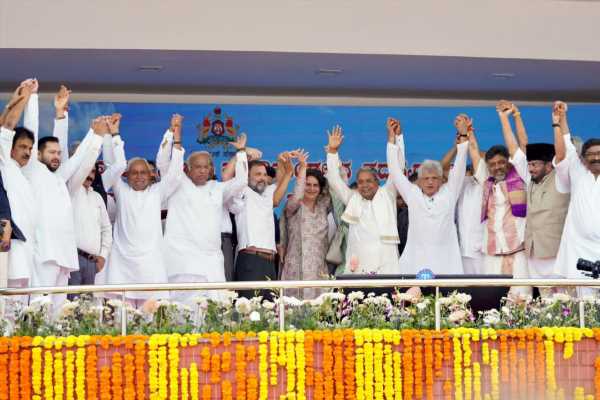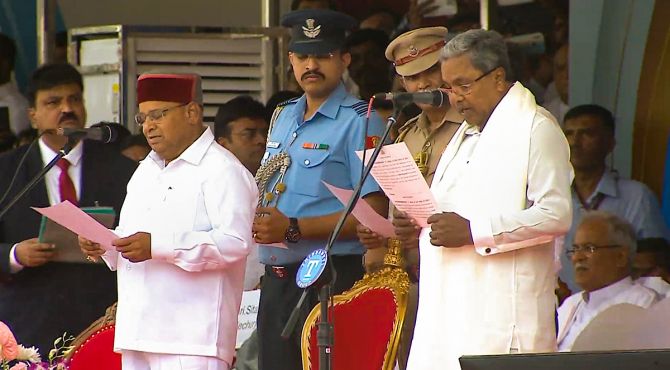Why weren’t the chief ministers of Andhra Pradesh, Goa, Kerala, Maharashtra and Telangana — all of which have borders with Karnataka — not invited to Saturday’s swearing-in ceremony, asks Shyam G Menon.
According to news reports preceding the swearing-in of the freshly elected Congress government in Karnataka, a slew of chief ministers and leaders from ‘like-minded parties’ were invited for the function.
The chief ministers of Bihar, Chhattisgarh, Himachal Pradesh, Jharkhand, Rajasthan, Tamil Nadu found mention.
Also in Bengaluru were the deputy chief minister of Bihar, the president of the Nationalist Congress Party, the president of the Shiv Sena (UBT), the presidents of the National Conference and the general secretary of the Communist Party of India-Marxist.
The general secretary of the Communist Party of India was personally invited by the Congress president while the chief minister of Tamil Nadu was called up by the chief minister designate of Karnataka, a report in the Economic Times said.
In its list of those invited, The Telegraph also included the chiefs of the Trinamool Congress and the Samajwadi Party.
Many of these politicians attended the swearing-in ceremony; a few deputed others.
On May 20 (the day of the ceremony), a couple of names not mentioned earlier — for instance, the Peoples Democratic Party leader and former Jammu and Kashmir chief minister Mehbooba Mufti and actor-politician, Kamal Haasan — also turned up.
The strange thing in this spectrum of invitees is that while several states enjoying no physical borders with Karnataka saw their chief ministers or party leaders mentioned in the list, four of the six states sharing borders with Karnataka appeared panned.
That is not only a weird idea of neighbourhood from the Congress, which fought elections using a campaign focused on issues relevant to Karnataka, it is also a puzzling way to foster good relations at a time of experiments in opposition unity.
For example, Wayanad in Kerala is the constituency from which, no less a person than the Congress’s Rahul Gandhi was elected to Parliament.
Whatever be the reason he was disqualified for — whether that was justified or unjustified — Wayanad paid the price alongside.
It endures the absence of an elected representative in parliament.
And yet, the state to which Wayanad belongs gets overlooked in the notion of inviting only like-minded parties for the swearing-in ceremony.
In Kerala, the Bhartiya Janata Party has been progressively converting elections in the state to a three pronged-contest.
It has been becoming evident that the real danger to the Congress in Kerala is the BJP.
The BJP has openly attempted making inroads into select community vote banks — the Christian bloc being one — that have traditionally stood with the Congress.
On the other hand, both the CPI-M-led Left Democratic Front (LDF) and the Congress-led United Democratic Front (UDF) have their commitment to inclusive politics and society.
It is a position that highlights their common difference from the polarising politics of the BJP.
However, even if they are to be competitors within this space of shared respect for a politics in line with the Constitutional definition of secularism, they must show solidarity as regards aversion for the BJP’s brand of politics.
If one constantly snubs the other, it weakens the credibility of both sides in the eyes of the electorate.
The Congress in Kerala may think of itself as eminently capable of defending its vote share or even eat into the BJP’s domain (the latter, in case it finds itself charged up that much in the aftermath of the Karnataka assembly election).
Whatever its self-belief and assessment of the situation, it merely underscores the need not to recklessly burn bridges with other parties committed to the secular spirit.
That’s why, an invitation to the chief minister of Kerala would have been a graceful gesture between neighbours.
As would have been, invites to the leaders of Andhra Pradesh, Goa, Maharashtra, Telangana — all of which have borders with Karnataka.
What is there to be afraid of? Even if you call such a diverse set of invitations defeating the purpose of anti-BJP Opposition unity, logic would tell you that the swearing-in of a state government is primarily a state-centric affair.
Its utility as a venue for displaying pan-India Opposition unity is secondary.
In fact, a professional Opposition quietly and consistently works towards its goal without making a spectacle and photo-op of every poll victory.
There is also another reason why a mightier-than-the-rest posture doesn’t suit the Congress at this juncture.
It is true that in the past the Congress was a mighty political party.
It is also true that there are many still arguing about the indispensability of the Congress in an Opposition-wall designed to check the BJP, something deemed essential for the 2024 general election.
What should equally be acknowledged is that the state of Indian politics subsequent to the elections of 2014 (the decade of BJP rule), is similar to what happened to humanity after the COVID-19 pandemic.
Human lifestyle was disrupted terribly by the pandemic and the effort required to get back to the old way is big.
For the Opposition, the route to recovery is one step at a time and the distance to cover is still significant.
It is this reality, which makes the specter of not inviting the chief minister of Kerala (or for that matter, the chief ministers of other states neighbouring Karnataka) an avoidable act.
Back in 2019, when the general election was announced and Smriti Irani chose to contest against Rahul Gandhi in Amethi, the Congress leader had filed his nomination papers from Wayanad in a bid to hedge his risk.
Kerala has traditionally been hospitable territory for the Congress and Wayanad is a known UDF bastion.
That arithmetic alone does not explain the support a candidate receives.
At the end of the day, a people have to actually back a given candidate.
They did so for Rahul Gandhi in 2019. He lost in Amethi associated with the Gandhi family for long but won from Wayanad.
Four years and many twists to his political career later, during what may be the finest hour yet for Rahul Gandhi and the Congress, the chief minister of Kerala (the state Mr Gandhi won from) is conveniently forgotten against the backdrop of ‘like-minded’ parties and possibly, the peculiar relationship between the Congress and the CPI-M; they are of late allies in electoral battles in Bengal and political foes in Kerala.
On May 20, The Telegraph in its report of the Kerala chief minister left out from the list of invitees, quoted Prakash Karat, CPI-M politburo member: ‘If this approach does not change, and it (the Congress) looks for narrow interests in one state and decides what will the approach be to Opposition unity, then there cannot be much headway (in forging Opposition unity).’
The same report said that Kerala’s leader of the opposition and senior Congress leader V D Satheesan defended his party saying that the All India Congress Committee had invited leaders of political parties to the function.
At 137 years of age, the Congress may be India’s grand old party.
But the geographical reality of the region called Karnataka and the region called Kerala being neighbours is millions of years old and the neighbourly relations of its two peoples, at least a few thousand years old.
What does it speak of the Congress if its political equation with Karnataka’s neighbour is more important than the status of the two states being neighbours?
Feature Presentation: Aslam Hunani/Rediff.com
Source: Read Full Article





